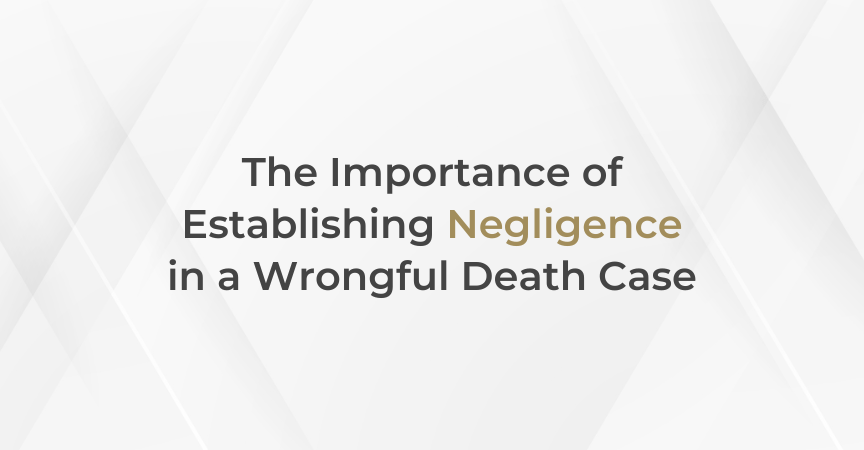It’s impossible to comprehend losing a loved one in an accident; even more devastating is knowing the person responsible could have prevented or avoided the accident altogether. Struggling families facing this nightmare seek justice by pursuing a wrongful death claim for damages with the reasonable expectation to hold responsible parties accountable.
What they may not realize is that their wrongful death case depends on whether the defendant’s negligent act caused their loved one’s death. Proving that negligence was the cause of death is complex, time-consuming, and costly. Yet, connecting negligence in a wrongful death claim builds a solid foundation for a just legal case.
The American Bar Association defines negligence in personal injury cases as:
- A party is liable if they were negligent in causing an accident, even if that was not their intention.
- Their liability for the accident stems from the careless or thoughtless conduct or their failure to act when a reasonable person would have to prevent an accident from occurring.
- Their conduct becomes “negligent” when someone fails to meet a legally recognized standard of taking responsibility given the circumstances to protect others from harm.
Experienced wrongful death attorneys know how vital it is to prove that the defendant’s conduct negligently caused the fatal consequence. To build a successful case, a solid foundation to prove negligence must begin with three essential tenets: gathering evidence, expert testimony, and the legal standard for negligence.
Gathering Evidence
Attorneys work like detectives to build a strong case and create a timeline, as evidence can disappear or become harder to collect over time. They gather all the data associated with the accident, such as medical records, accident reports, witness statements, and scene photos. They request phone records and vehicle maintenance information to analyze and piece together what happened.
Attorneys will also collect information about the victim, including income records, financial contributions to the family, and personal documents, to show how significant the deceased was to the family unit.
Expert Testimony
Attorneys employ expert witness testimony to explain complex subjects to judges and juries in easy-to-understand language. Medical experts distill medical details of the accident, such as examinations and reports. Accident reconstruction specialists present easy-to-comprehend visual data and presentations of how a crash or incident occurred. Financial experts speak to the economic impact the loss of the loved one has on the family regarding lost wages, benefits, and household services the victim would have provided the family over a lifetime. Experts such as “life care planners” testify to calculations made for the “value of care” for children and dependents.
Legal Standards for Negligence
To successfully pursue a compelling wrongful death case, attorneys must prove four key elements: duty, breach, causation, and damages.
Duty of Care—The lawyers must convince a judge or jury that the defendant failed to exert the legally recognized standard of care to act safely toward the deceased victim. The duty of care also applies to the circumstances surrounding the death.
Breach of Duty—Lawyers prove that the defendant failed to meet a recognized standard of care. The standard is typically what a “reasonable person” would have done in the same situation. Skilled attorneys use evidence and expert testimony documenting these specific actions or failures to compare the defendant’s actions to this standard to determine causation.
Causation—Experienced wrongful death attorneys establish the defendant’s breach of duty in the death of the victim by proving the death would not have occurred without the defendant’s negligent actions. Causation demonstrates that negligent conduct was a significant element in the fatality. The legal team argues a “reasonable person” would have acted in the following ways:
- The defendant could have expected their actions might cause harm.
- A reasonable person in the defendant’s position would have recognized the risk.
- Establish that the type of harm that occurred was a foreseeable consequence.
Damages and Impact
Losses and damages consider how the surviving family members have suffered as a result of a wrongful death claim. This comprehensive report calculates economic damages, including lost income, benefits, and support. Damages also include quantifying non-economic damages, such as loss of companionship and guidance.
The trusted legal professionals at Fitzgerald Law Firm work tirelessly to secure just and fair compensation that honors the victim’s memory and provides families with the financial stability they need to move forward. Below are some ordinary Negligence in Wrongful Death scenarios the firm has successfully handled for over four decades:
Medical Malpractice: When accepted medical standards are not followed by healthcare providers, preventable deaths can occur through misdiagnosis, surgical errors, or medication mistakes.
Motor Vehicle Accidents: Deaths caused by reckless driving, impaired driving, or failure to follow traffic safety laws demonstrate apparent negligence on the part of responsible drivers.
Workplace Incidents: Carelessness can lead to unsafe workplaces. Manufacturers of equipment may be liable when workers die from preventable accidents.
Understanding how attorneys prove negligence in wrongful death cases helps families recognize the importance of experienced legal representation from the beginning.
Proving Negligence in a Wrongful Death Case
Success in a wrongful death claim starts with an expert legal team well-versed in what it takes to handle all the complexities associated with proving negligence in wrongful death cases.
In times of such tragedy, families need to know that these professionals understand the legal intricacies and that they also understand the emotional weight the families experience as they attempt to negotiate life without their loved one.
Fitzgerald Law: 50 Years Representing Wrongful Death Victims
Fitzgerald Law Firm has been proving negligence in wrongful death cases for clients for over fifty years. Their dedicated legal team has achieved significant results. It is proud to hold the record for the largest verdicts for personal injury and wrongful death ever upheld on appeal in Wyoming’s history.
If you have lost a loved one due to negligence, contact the legal professionals at Fitzgerald Law Firm so we can guide you through the process to get the justice you and your family deserve.
